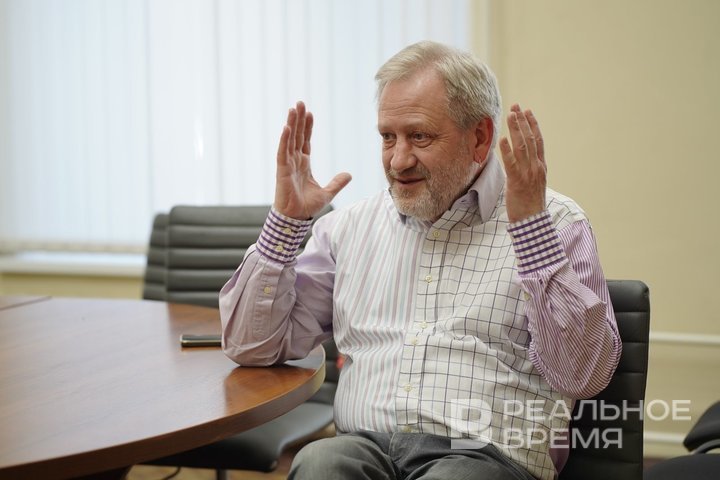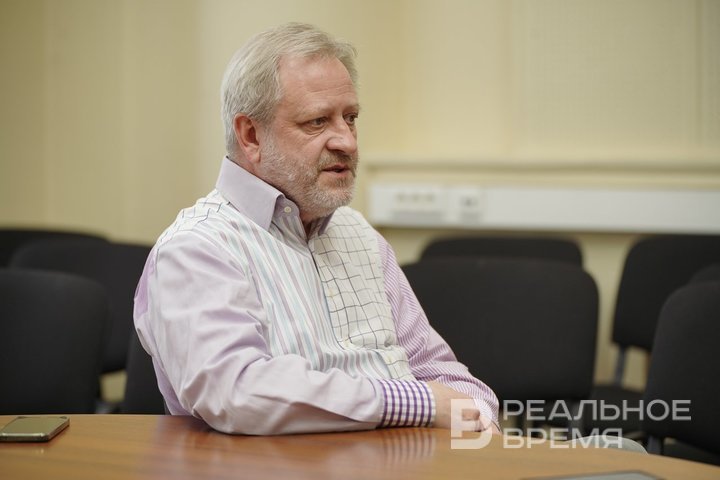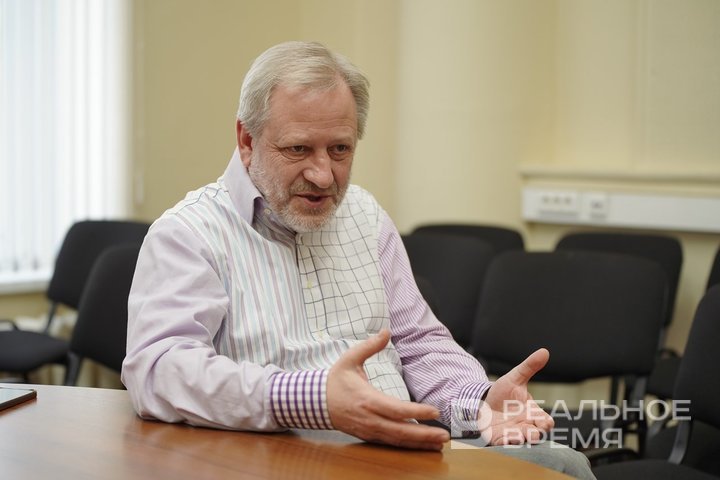Alexey Vishnevetsky: ‘28 identical websites that copy each other’s news is not journalism’
Deputy Chairman of the Union of Journalists of Russia — on professional ethics, killing of Soviet education, the peculiarities of generation Z and the main task of journalism

The essence and fundamentals of a journalist's professional ethics have not changed, but the technical capabilities of delivering information have changed. People are drowning in information flows, but numerous telegram channels are not journalism. The industry is experiencing a huge shortage of staff, but a young journalist should not immediately expect huge fees. Generation Z is not prone to deep analysis, but there has always been a generational conflict. Alexey Vishnevetsky, the deputy chairman of the Russian Union of Journalists, spoke with Realnoe Vremya about this and many other aspects of the modern development of journalism.
“The basic ethical principles of journalistic work do not change”
What are the main changes in world journalism that have taken place over the past 30 years, and does what is happening in Russian journalism correspond to these changes?
The main changes are related to the emergence of another information delivery channel, namely, the Internet. Whether we like it or not, if before his appearance all information came from journalists, today there is no such monopoly. An information mudflow falls on the unfortunate people. It is there, it is a given, it will not disappear anywhere and it will only grow. Journalistic information remained a small percentage in this huge flow.
From the point of view of the profession, nothing has changed. Only the technical capabilities change. There were typewriters, and now computers. There are search engines, and this is good and convenient. After all, previously information could only be obtained with “feet” or phone calls. But now we can quickly find the numbers necessary for the material, facts, and additional information about people we are interested in. It's wonderful. But our basic ethical principles of journalistic work do not change.
Are they respected?
I would say so: they must be respected in any case. And they are unchangeable. If we carefully read any codes, we will see two fundamental principles in them. The first is that a journalist ensures the right of citizens to receive reliable information. This is also stated in the Constitution that citizens have such a right. And the second principle is that under any circumstances, reliability is more important than efficiency.
Here we come to the Internet itself. To telegram channels, to bloggers.
Journalism is not changing, but we have ceased to be carriers of the news as such. We can't keep up with the news because we have to check it. And that's why we're getting more and more involved in analytics, emotions, and stories.
“Youth is a disadvantage that passes very quickly”
But many people need what is called efficiency.
Because young people are all in the telegram, and this is normal for them. Young people are not prone to generalisations, they live by momentary emotions. Especially generation Z. But that's okay. Then they will grow up.
By the way, we were the same. It's just that we basically didn't have such opportunities. For example, I don't remember being very interested in the events of the Thirty Years' War. I didn't really want to draw any conclusions from it or draw historical analogies. People come to read historical literature, to watch documentaries — but later.
I keep saying that youth is a disadvantage that passes very quickly. And it is not necessary to say that young people are now either good or bad. Just out of interest, let's read the collections of letters of our classics of the 19thcentury — Turgenev, Goncharov, Tolstoy. They all write: “Lord, who's coming after us? It is all over!”
Just out of interest, let's read the collections of letters of our classics of the 19th century — Turgenev, Goncharov, Tolstoy. They all write: “Lord, who's coming after us? It is all over!”

“District newspapers remain the backbone of the country's information security system”
There is an opinion that in countries with a developed Internet, the paper press is out of date and sooner or later will be replaced by an online format. What do you think about this? Is the existence of paper media in an informational (non-entertainment) format possible today without government investments?
t's not just about print media — television is also impossible without subsidies. After all, our products are very expensive. As far as I understand, all media outlets are subsidised either by the state or by non-governmental organisations. Somewhere it is 80%, and somewhere it is 15% of production costs.
As for that the paper press has no future in countries with a developed Internet, this is a misconception. In Germany, newspapers have 128 pages each — isn't there an Internet connection? The circulation is growing both in Finland and in the USA. Perhaps, they are increased by advertising tabs — for example, in Germany, advertisements for nearby shops are placed in district newspapers. But it all works!
My hometown Moskovskaya Pravda, where I started working, decided to go completely online in 2016. This lasted for 2 months, after which I had to return to the weekly publication of a printed newspaper. It turned out that the Internet does not live without paper. Partners, advertising customers — everyone wanted to see the publication on paper. Someone still wants to buy it, subscribe to it.
In addition, regional newspapers are still the backbone of the country's information security system. This is well understood at the very top, and they will be supported, I think, for a very long time.
It's not just about print media — television is also impossible without subsidies. After all, our products are very expensive. And, as far as I understand, all media outlets are subsidised either by the state or by non-governmental organisations
“Unfortunately, there are no thorough, multi-stage checks anymore”
Do you note the problem of deterioration in the quality of preparation of materials in online publications due to that edits can be made in this mode even after publication? Does this affect the quality of modern journalism?
Of course. Again, it depends on what is called journalism. Twenty-eight identical websites that copy each other's news is not journalism. You see, journalism is primarily about a sense of responsibility. You are responsible for what you write, say, and tell. For everything you bring out in public.
Now the savings have led to fewer editors and proofreaders. In some places, the position of proofreader has been abolished altogether — the text editor, they say, will highlight the errors himself. But he sometimes highlights strange things and doesn't highlight obvious mistakes! All this needs to be monitored.
I worked for 5 years in the documentary film service of the Rossiya TV channel and was the head of the external production department. We released more than a thousand films. And there was not a single factual or spelling error in any of these films. Why? Because the first thing I did was bring a professional proofreader to our group, who checked everything.
In some publications (in a few, I must say) there is a fact checker — a person who checks the texture.
I do not know these new words. What kind of fact-checking? Proofreading! The verification group. Somewhere they are, and somewhere they are not. Of course, no one is immune from that ten people read the note, and still the error slipped through. But you have to put up some barriers, right? Previously, sometimes there was such a role in newspapers as a “fresh mind”. One of the correspondents came and read the whole issue through after proofreading. And then the literary editors (they are also censors) read. And by the way, they also caught errors.
Unfortunately, there are many places where there is no such thorough, multi-stage verification. I think we need to return it.

Journalism is primarily about a sense of responsibility. You are responsible for what you write, say, and tell. For everything you bring to the public
“As a result of the introduction of the Unified State Exam and the Bologna system in universities, the education system was destroyed”
The journalism industry, at least in Tatarstan, is experiencing a huge personnel shortage. Talented graduates of journalism schools do not linger in the media. Is this trend spreading to Russia, according to your observations? And what is the current situation with promising personnel who can and, most importantly, are ready to develop in the profession?
There has always been a shortage of personnel. There are generally not enough talented people in the world, especially those who are willing to work from morning to evening for little money. As one of our editors said, there are two problems in television: it is difficult to get a job and there is no one to work. Moreover, if you think that there is some other situation in Moscow, then you are deeply mistaken. Similarly, there are not enough qualified personnel. But this is not only a problem of journalism. This is a problem for society as a whole and for all professions, because the era of amateurs has now arrived.
What was the reason for its onset?
As a result of the introduction of the Unified State Exam and the Bologna system in universities, our education system was basically destroyed. It didn't happen today, but in the nineties. This is our “beautiful” legacy from the liberal-minded Yeltsin era. From the absolutely harmful, one might say, criminal activities of a number of then-statesmen who tried in every possible way to fulfill the order of our enemies to destroy the country.
In 1999, then-minister Fursenko said that we should move away from the Soviet education system, which educated a creative person, and educate a consumer person. It was then that the Unified State Exam system began to be introduced, under the very beautiful pretext that it would end corruption in university admissions.
But it actually killed it.
Along with the education. Because children are not given education, but the ability to answer test questions. The last two years of school are devoted exclusively to testing. While the testing system was introduced for mentally retarded children in the mid-fifties in the USA. Since these children were unable to answer the question in detail, they had to be provided with answers from which they could choose. It was easier that way. And then, for reasons of tolerance, so that mentally retarded children would not feel inferior, the testing system was extended to healthy, full-fledged children. Thus, healthy children were equated with the mentally retarded.
Why are so few young journalists joining the profession?
Because they are uncomfortable. After all, this is Generation Z. As soon as they feel uncomfortable about something, they give it up. For example, you can't call them by phone — you have to write first. Not because they're harmful, but because a phone call is stressful for them. And if they need to collect analytics and call 50 experts, what should they do? They have a very complex motivation system — for example, money does not motivate them.
They also tell us: artificial intelligence is coming, and you will all be fired.
No artificial intelligence will interview the mother of a girl who died at the hands of a maniac. Artificial intelligence will not make a report from the front line somewhere there, near Yasinovataya. But rewriting, dozens of identical sites — of course, AI is already doing this work. Rewriters are already being downsized. And that's okay, because they're not journalists.

No artificial intelligence will interview the mother of a girl who died at the hands of a maniac. Artificial intelligence will not make a report from the front line somewhere there, near Yasinovataya
When computers appeared, our powerhouse, the mastodons of the editorial office said: “It's just impossible to work on a computer. I have a typewriter, and emotions flow into the text through the keys.” And then they saw that there was no need to reprint the text — it was enough to swap the paragraphs. Or you can replace the word. It's fast and convenient. And everyone got used to it. And none of them were fired, but the profession of a typesetter left — computer typesetters appeared. Typists also remained only in large editorial offices. In the same way, the profession of a decryptor is leaving — there are already good programs that cope with this.
Anything that helps us, let it be! Artificial intelligence itself is fine. The main thing is to apply it correctly. And so far, I don't see any danger to the profession of a journalist. Perhaps its development will be a blow to some auxiliary services.